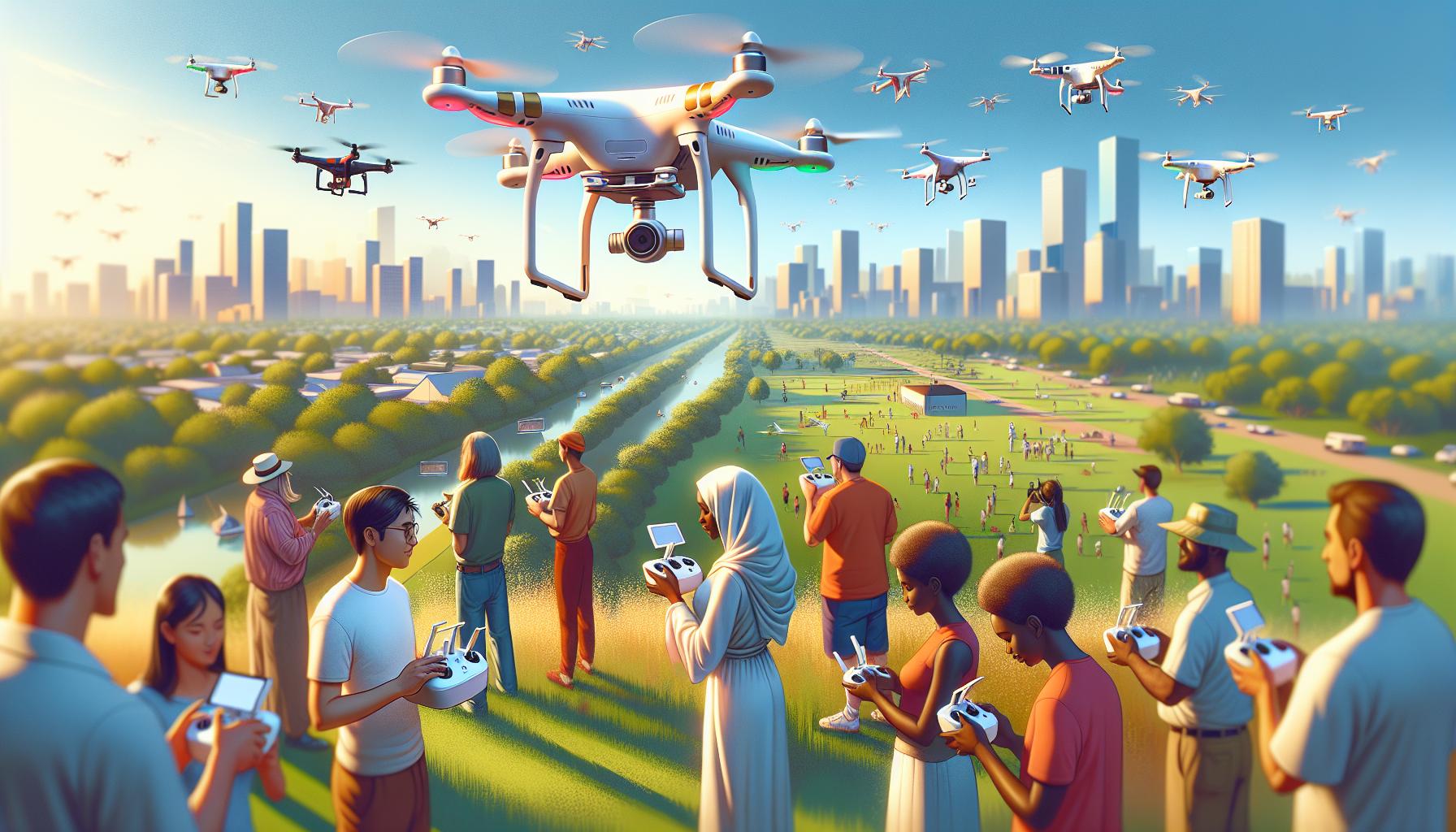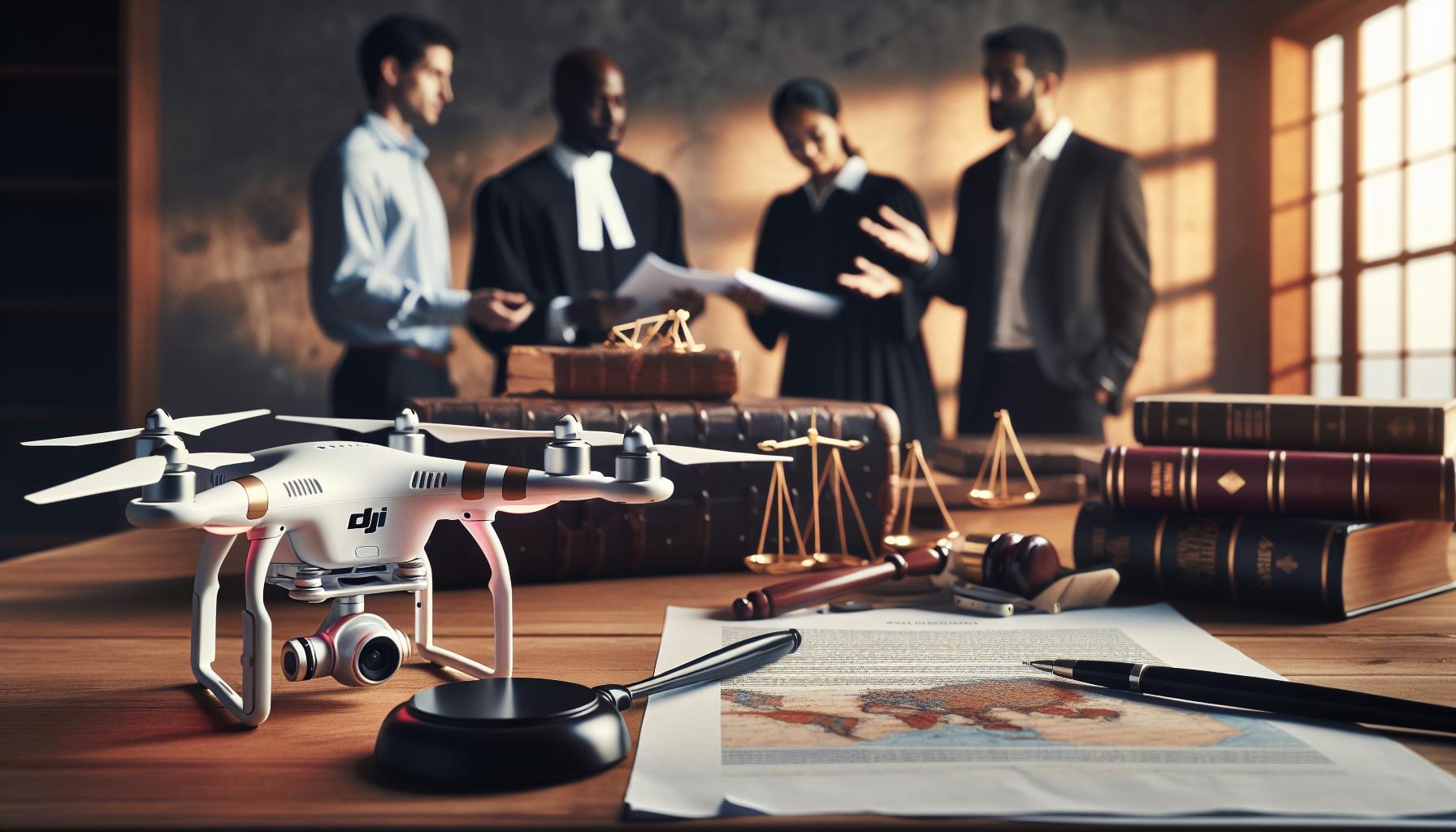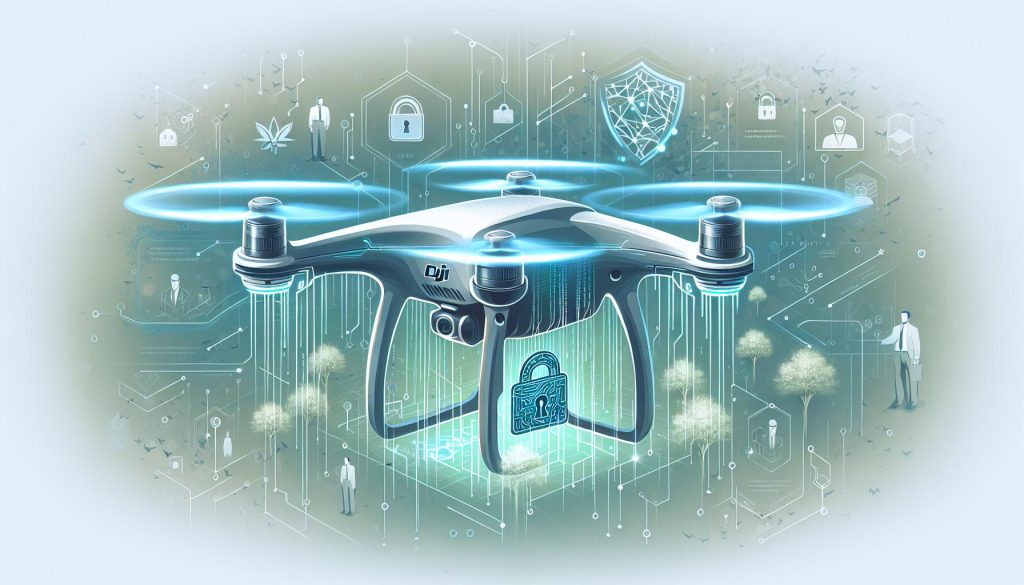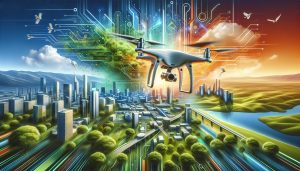In recent years, DJI drones have come under scrutiny due to security concerns, raising questions about their use among both enthusiasts and professional operators. As one of the leading manufacturers in the drone market, the potential for a ban on DJI products invites anxieties about accessibility, safety, and the future of drone technology. Understanding the reasons behind these concerns is crucial for anyone invested in drone flying, whether for fun, work, or industry applications. This article delves into the specific security issues associated with DJI drones, exploring the implications for users and what could lie ahead in the evolving landscape of drone regulations. Join us as we unravel the facts and provide valuable insights that could shape how you approach your next drone purchase or flight adventure.
Why Are DJI Drones Banned? Understanding Security Risks
Concerns surrounding the use of DJI drones have escalated in recent years, leading several countries to implement bans or restrictions. These measures often stem from fears related to data security and privacy, as well as geopolitical tensions. Reports have surfaced indicating that DJI drones could be susceptible to unauthorized data access, raising alarms among government officials who prioritize national security. Notably, critical military and infrastructural areas are particularly sensitive to aerial surveillance technologies that could compromise confidentiality.
The interplay between technological innovation and regulation becomes clear when considering DJI’s ownership and its operational framework. Being a Chinese company, DJI faces scrutiny from nations such as the United States, which cites potential risks associated with data being transmitted to servers in China. Such concerns warrant a critical examination of how the Chinese government might leverage this data, even if DJI publicly denies any intention to misuse data or aid in governmental surveillance. As a result, various government agencies have opted to restrict or completely ban the use of DJI drones, particularly within security-sensitive entities.
Real-world consequences of these bans can be dramatic. For instance, in the U.S., the Department of Homeland Security issued warnings regarding the potential for DJI drones to transmit sensitive data back to China. This has prompted some state governments to re-evaluate the contracts and procurement processes involving drone technology, thereby impacting local law enforcement and public safety agencies that rely on aerial photography and data collection.
Understanding these security risks is essential for drone operators-both hobbyists and professionals-who must navigate a landscape marked by evolving legal restrictions and potential liabilities. As public concern grows, staying informed about the implications of flying DJI drones becomes a responsibility for all users who wish to ensure compliance with current regulations while mitigating privacy concerns.
The Rise of DJI Drones: A Global Phenomenon
The rapid ascent of DJI drones has transformed the landscape of aerial photography, filmmaking, and recreational flying. As one of the leading manufacturers in the drone industry, DJI has captured the imagination of hobbyists and professionals alike with its innovative designs, user-friendly interfaces, and high-quality cameras. The company has become synonymous with drone technology, boasting a diverse range of models, including the Mavic series, which offers compact designs loaded with advanced features, and the Phantom series, known for its robust capabilities and superior image quality. This global phenomenon is underpinned by not just technological advancement but also by a committed community that thrives on sharing experiences and tips for flying.
However, this meteoric rise has not been without its challenges. With the increasing adoption of DJI drones, concerns regarding security and data privacy have intensified, particularly among governments and regulatory bodies. Numerous reports have emerged suggesting that DJI drones may pose potential security risks, primarily due to the data transmission to servers that could be located in countries deemed less secure. Such fears are exacerbated by the geopolitical tensions that underline international relations in today’s world. As DJI drones proliferate in various aerial operations, from cinematography to surveying, questions arise about who controls the data captured by these devices and how it may be used.
The intersection of DJI’s technological appeal and the anxieties surrounding its safety is influencing government policies. Countries like the United States have flagged concerns about potential data leaks and foreign surveillance, leading to restrictions on drone usage in sensitive environments. As these narratives unfold, the significance of making informed choices about drone operation becomes evident. Engaging with this digital ecosystem requires not only technical proficiency but also a proactive stance on navigating the compliance landscape.
Ultimately, as interest in aerial technology grows, a balanced perspective that recognizes both the innovative capabilities of DJI drones and the overarching security concerns will be crucial. Understanding this dynamic ensures that drone users-from enthusiasts to professionals-can cultivate safe and responsible flying practices, leveraging the benefits of modern drone technology while remaining cognizant of the evolving regulatory frameworks that govern their use.
Security Concerns Surrounding DJI Technology
Concerns regarding the security surrounding DJI technology have become increasingly prevalent, with many users, regulators, and policymakers closely examining the implications of using drones designed by a company rooted in China. High-profile debates have erupted over the potential for data interception and unauthorized access to sensitive information captured by DJI drones, due to the data transmission protocols that send images and flight data to servers that could be located in regions with less stringent privacy laws. This situation is compounded by the fact that DJI is one of the largest drone manufacturers worldwide, which raises questions about the vast amount of data collected from its user base.
Understanding the nature of these security concerns is critical for both professional operators and hobbyists looking to navigate this complex landscape. One of the primary fears is related to data privacy risks. As DJI drones often utilize cloud-based technologies for features like real-time video streaming and flight data storage, there is the potential for sensitive information to be accessed by unauthorized parties. This risk is particularly concerning for users operating in sensitive environments, such as government sites, military installations, or large gatherings where personal and private data is at stake.
Moreover, the geopolitical context in which DJI operates cannot be ignored. Heightened tensions between nations, particularly the U.S. and China, have resulted in national security assessments that frequently associate DJI drones with espionage due to the risk of data surveillance. As a result, various government entities have imposed restrictions on their use in official settings or have outright banned them from certain uses. Users must be aware of the implications these regulations have for both personal use and commercial applications.
To mitigate these risks, drone users are encouraged to adopt best practices when operating DJI devices. This includes regularly updating firmware to ensure the latest security patches are applied, utilizing local storage options whenever possible, and being cognizant of where and how data is transmitted. By understanding the concerns surrounding DJI technology and taking proactive measures, users can enhance their operational security while still benefiting from the advanced capabilities that DJI drones offer.
Government Policies and Regulations Impacting DJI Drones
In recent years, the rise of DJI drones has been accompanied by an increasing wave of scrutiny from governments around the globe, resulting in a patchwork of regulations and bans. The motivations for these actions often stem from national security concerns, particularly related to data privacy and potential espionage. For instance, in the United States, federal agencies have raised alarms over the possibility that DJI drones could be transmitting sensitive information back to servers in China, prompting several government entities to restrict or prohibit their use in official capacities.
Global Regulatory Landscape
Governments are responding to perceived threats-including the risk of surveillance and data theft-by implementing specific regulations targeting the operation of drones from DJI. For example:
- Federal Bans: In the U.S., the Department of Defense has banned DJI products from being used at military sites due to cybersecurity concerns.
- Local Legislation: Some cities and states have enacted their own restrictions, limiting where and how DJI drones can be flown, particularly in sensitive areas.
- International Bans: Countries like India have also raised concerns, leading to tighter import regulations on DJI products amid fears of data being siphoned off.
These evolving policies reflect a recognition of the dual-use nature of drone technology, where civil applications may overlap with military interests. It is crucial for drone enthusiasts and commercial operators to stay informed about the regulatory environment affecting their operations, as non-compliance can lead to severe penalties or loss of operational licenses.
Compliance and Best Practices
For individuals and businesses utilizing DJI drones, understanding and adhering to relevant regulations is essential. This involves:
- Monitoring Updates: Keep abreast of changes in local and national policies regarding drone operation.
- Implementing Data Security Measures: Use features within DJI drones that limit data transmission or choose to store footage locally whenever possible.
- Community Engagement: Participate in discussions with local regulatory bodies or drone advocacy groups to advocate for fair legislation that considers the benefits of drone technology alongside security concerns.
By proactively addressing the security implications associated with DJI drones and remaining compliant with governmental regulations, users can navigate this complex landscape effectively while still enjoying the advanced capabilities that these drones offer.
Data Privacy Issues: What You Need to Know
The proliferation of DJI drones in everyday commercial and recreational use has raised significant concerns regarding data privacy, a topic that has captured the attention of users and regulators alike. As the capabilities of these drones expand, so does their potential for collecting sensitive information-such as aerial imagery and geographical data-which can inadvertently breach privacy boundaries. A key issue at hand is that data captured by DJI drones may be processed and stored on servers that are perceived to be outside the direct control of the users, raising suspicions over its safeguarding and usage by third parties.
To tackle these issues, it is crucial for drone operators to educate themselves about the data handling procedures related to their devices. DJI has taken steps to enhance data privacy features, such as allowing users to disable data recording during flights or localize storage. Engaging with the drone’s settings can significantly reduce the risk of unintended data transmission. Here are some practical measures users can take:
- Awareness of Data Settings: Familiarize yourself with the data management features in the DJI app. Opt for local storage instead of cloud uploads whenever possible to keep your data private.
- Firmware Updates: Regularly update your firmware, as improvements often include enhanced security protocols and fixes that protect against vulnerabilities.
- Data Transmission Permissions: Review the app’s permissions on your mobile device, ensuring that you limit what data can be shared or accessed.
Furthermore, as various international entities express skepticism toward DJI technology, understanding local regulations surrounding drone operation becomes indispensable. Operators should stay informed about legal requirements, such as data privacy laws that may affect drone use in certain jurisdictions. States may impose restrictions on flying in sensitive sectors, and being knowledgeable about these regulations can prevent legal complications.
Ultimately, fostering a proactive mindset towards data privacy not only reassures users but also contributes to a culture of responsible drone operation. Balancing advanced technology functionalities with diligent data protection practices exemplifies the commitment to ethical and controlled use of such innovative tools.
International Responses to DJI Drone Security Risks
Concerns regarding DJI drones have prompted a variety of international responses that reflect a growing unease about security risks associated with the technology. As some governments express apprehension over the potential misuse of data collected by these drones, others have taken definitive actions to restrict their use within specific contexts. For instance, the United States has implemented bans on the use of DJI drones among federal agencies, citing national security risks mainly tied to data encryption and ownership concerns. This has led various states to follow suit, creating a patchwork of regulations that leaves drone operators navigating a complex legal landscape.
Countries like India and the European Union have also scrutinized DJI products, launching investigations against them for compliance with local laws and safety standards. In India, authorities have issued guidelines stipulating that only drones with certain certifications can be operated, thereby restricting DJI drones unless they meet these regulatory requirements. Meanwhile, the EU has focused on stringent data protection regulations under the General Data Protection Regulation (GDPR), leading to heightened scrutiny of how DJI handles user data. Such policies underscore the importance of transparency in data processing practices and compel companies like DJI to adapt their technologies to comply with regional regulations.
While these actions are often framed within the scope of national security, they also highlight the balancing act that governments face: promoting technological innovation while ensuring public safety and privacy. Collaborative efforts at the international level are becoming increasingly relevant, as countries share best practices and develop uniform standards for drone use. This is evident in forums like the International Civil Aviation Organization (ICAO), which pushes for a more coordinated approach to drone regulation. As these discussions unfold, businesses and consumers alike may find themselves needing to adapt to an evolving framework that addresses both the benefits and risks associated with drone technology.
In light of these developments, drone users are advised to stay informed about local and international regulations that may impact their operations. Engaging with local regulatory bodies and participating in forums aimed at fostering safe drone practices can be beneficial. Moreover, adopting a proactive stance towards understanding the security implications of their equipment will empower operators to make informed decisions, ultimately leading to a more responsible and innovative use of drone technology.
The Impact of Geopolitics on Drone Usage
The interplay between geopolitics and drone usage is increasingly evident, as nations weigh the technological advantages of drones against potential security threats. DJI, as a leading manufacturer of consumer drones, has found itself at the center of this geopolitical landscape, leading to heightened scrutiny and, in many cases, outright bans on its products in various countries. These actions reflect deeper national interests, including concerns about surveillance, data security, and influence over critical technologies.
Countries like the United States have raised alarms about the potential misuse of DJI’s technology, particularly regarding the collection and storage of sensitive data. The fears are not just theoretical; incidents involving unauthorized data sharing or vulnerabilities in cybersecurity have heightened distrust. In response, the U.S. has issued bans on DJI drones for federal agencies, which has rippled down to state and local regulations, creating a nuanced environment where drone operators must navigate a complex legal landscape. This environment compels operators to be not just aware of drone technology but also of the geopolitical implications surrounding their use.
In regions like Europe and India, the response has generally included thorough investigations into the compliance and data practices of DJI. For instance, the EU’s General Data Protection Regulation (GDPR) has imposed rigorous standards that demand transparency from technology companies regarding user data handling. This geopolitical scrutiny extends beyond mere compliance; it often emerges from broader concerns regarding global influence and technological sovereignty. Countries are not just regulating for safety but are also positioning themselves against perceived threats from foreign entities that may monopolize data or exert undue influence through technology.
As technology continues to evolve, drone enthusiasts and professionals need to stay informed about these geopolitical dynamics. Understanding local and international regulations can be vital in maintaining operational legitimacy. Engaging with regulatory bodies, being proactive about data security practices, and participating in discussions on drone applications can enhance the safety and acceptance of drone technology within a complex geopolitical framework. Awareness of this landscape not only fosters responsible usage but also encourages innovation within the constraints of ever-changing regulations and security considerations.
Comparing the Security of DJI with Other Brands
DJI has emerged as a leader in the drone market, but security concerns have led many to question how its technology compares to competitors. The critical issue at hand revolves around data privacy and how different brands handle sensitive information. DJI’s proprietary technology collects substantial data during flights, which raises red flags in nations wary of surveillance risks. As a result, its practices have been scrutinized more intensely than those of many other manufacturers, making it essential for consumers to weigh the implications of their choices when selecting a drone.
In comparison, brands such as Parrot, Yuneec, and Autel Robotics often emphasize their commitment to privacy. For instance, while DJI drones frequently connect to the internet and rely on servers based in China for firmware updates and operational support, other brands prioritize local data handling. This localization can make a difference for privacy-conscious users. Parrot, for example, has developed a range of drones that function independently of a cloud connection, offering features that can be particularly appealing to users concerned about data access. Additionally, companies like Autel Robotics highlight their secure data protocols, claiming that users’ information remains within their control.
Highlighting specific security measures can further clarify the differences. Many brands now offer customizable settings allowing users to limit data sharing and GPS functionalities. For example, DJI’s SkyPixel platform mandates account creation, which some critics argue could expose users to risk if data handling policies are not transparent. However, alternatives like Yuneec provide options for offline operations, allotting a greater degree of control over the data collected during flights.
Navigating the landscape of consumer drones requires awareness of these differences. While DJI’s extensive features and robust ecosystem often come with substantial benefits, users must remain cognizant of the associated security risks. By exploring alternative brands, drone operators can find models that align more closely with their security needs. Whether opting for DJI or another manufacturer, being informed about data privacy policies and operational security practices will empower users to make the best choices for their flying.
How to Choose Safe Drones: Buyer’s Guide
Choosing the right drone can be a daunting task, especially with security and privacy concerns looming large in the current landscape. To make an informed purchase, it’s essential to prioritize key features and specifications that align with your specific needs as a user, whether you’re a hobbyist or a professional. One critical aspect to consider is the data handling practices of the manufacturer. For example, brands like DJI have faced scrutiny due to their data collection and transmission protocols, often relying on cloud servers for updates and operational support. This raises potential privacy and security issues for users concerned about data breaches or unauthorized surveillance.
When evaluating drones, consider the following factors:
- Data Privacy Policies: Investigate how each manufacturer handles user data. Look for brands that emphasize local data storage and provide options for offline operation, minimizing your exposure to potential risks.
- Customization Options: Select drones that offer customizable settings for data sharing and GPS functionalities. This empowers users to control what information is shared and when, increasing overall security.
- Firmware Update Transparency: Examine how updates are conducted. Opt for companies that clearly communicate their update processes and provide users the option to manage updates without mandatory cloud connectivity.
- Reputation and Reviews: Research user reviews and expert comparisons. Understanding real-world experiences can offer insights into a brand’s reliability and responsiveness to security concerns.
In order to stay compliant with local regulations, it’s also critical to evaluate the drone’s features concerning safety and flight operations. Look for technologies such as geofencing to prevent unauthorized airspace entry, obstacle avoidance systems that enhance in-flight safety, and comprehensive user training resources that help you master the drone’s functionalities.
Educating yourself about these aspects not only helps you avoid potential pitfalls but also allows you to take full advantage of your drone’s capabilities while ensuring a safe flying experience. Making an informed decision on the right drone will empower you to enjoy all the benefits of aerial photography, videography, or just recreational flying, without compromising on safety and security.
Best Practices for DJI Drone Users Today
Successfully operating a DJI drone requires adherence to specific practices that not only enhance safety and efficiency but also help mitigate the security concerns often associated with these devices. Understanding how to best utilize your drone while being mindful of privacy and regulatory issues can make all the difference in your flying experience.
One fundamental practice involves keeping your firmware up to date. Regular updates ensure that your drone is running the latest software, which can improve performance, enhance security features, and even introduce new functionalities. To update your drone, connect it to the DJI app, which will notify you of available updates. Always review the release notes to understand what changes are being made and how they may affect your drone’s operation.
Data Management and Privacy
Another critical aspect to consider is how you manage the data collected during flights. Given the scrutiny that DJI has faced, it’s important to be mindful of where your data is stored and how it is used. Opt for local data storage options whenever possible and familiarize yourself with the privacy settings on your drone. You want to limit the sharing of sensitive information and be aware of what data is processed by the manufacturer. Take time to read through the privacy policy of DJI to fully understand how your information is handled.
Furthermore, being knowledgeable about local regulations is crucial. Different regions have varying laws governing drone usage, including where you can fly, height restrictions, and no-fly zones. Using apps that provide real-time airspace information can be invaluable for staying updated on these rules. Ensure that you fly your DJI drone in compliance with legal requirements, applying practices such as pre-flight checks that confirm you are in a safe and lawful flying area.
Community Engagement and Learning
Engaging with the drone community can greatly enhance your skills and awareness. Joining forums and local drone clubs provides opportunities to learn from others’ experiences, share insights on best practices, and stay informed about the latest developments in drone technology and regulations. Participating in drone meetups or online groups allows for knowledge exchange, which can be particularly beneficial for new users as they navigate the complexities of drone operation.
By adhering to these best practices-keeping your firmware updated, managing data wisely, understanding local regulations, and fostering community engagement-you’ll not only enhance your flying experience but also contribute to a safer and more responsible drone culture. This proactive approach can significantly reduce the security risks associated with DJI drones and help preserve the integrity of drone usage in various contexts.
Future of DJI Drones: What Lies Ahead?
The landscape of drone technology is evolving at an unprecedented rate, and DJI, as one of the leading manufacturers, is poised to play a crucial role in that trajectory. With innovations continuously shaping the capabilities of drones, the future holds exciting possibilities that not only enhance performance but also address the pressing security concerns that have led to bans and regulatory scrutiny. Staying ahead in this competitive field, DJI is likely to invest heavily in developing advanced security features, ensuring data protection, and fostering compliance with global regulations.
As consumer needs and regulatory pressures heighten, DJI may focus on integrating robust encryption and data management systems into their drones. This could involve using local data storage solutions to address privacy concerns directly, allowing users to have greater control over their information. Enhanced security protocols may also reassure government and commercial entities that DJI drones meet stringent requirements, potentially easing restrictions imposed on their use. Additionally, DJI could expand educational resources and community engagement to foster informed usage, helping operators understand and mitigate associated risks.
The rise of autonomous drone technology is another exciting frontier. Developments in artificial intelligence and machine learning could enable DJI drones to perform complex tasks without direct human oversight, paving the way for applications in agriculture, infrastructure inspections, and search and rescue operations. As regulations develop around automated flights, DJI could be positioned to lead discussions on safety standards and ethical frameworks that govern these advancements, ensuring responsible drone usage.
Innovations in battery technology and propulsion systems are likely to enhance flight times and operational ranges, making DJI drones even more appealing for professional and recreational users alike. With improved efficiency, drones could tackle more extensive projects, from aerial photography to surveying vast areas for environmental studies. In parallel, DJI will need to address the geopolitical landscape, navigating restrictions while working with international partners to establish standard protocols that promote safe drone operation.
In conclusion, the future of DJI drones not only hinges on technological advancements but also on establishing a foundation of trust through enhanced security features and compliance with global regulatory standards. By addressing existing concerns and focusing on innovation, DJI can continue to lead the drone industry while empowering users to operate safely and responsibly in an increasingly complex environment.
Educational Resources for Informed Drone Flying
As drone technology continues to evolve rapidly, understanding how to operate these flying machines responsibly and legally is paramount. With a growing emphasis on safety and security, especially surrounding brands like DJI, educational resources play a crucial role in empowering operators to navigate the landscape of drone flying effectively. Whether you are a novice just starting or a seasoned pilot looking to brush up on best practices, gaining knowledge is essential for informed decision-making and compliance with regulations.
One of the most practical steps you can take is to familiarize yourself with online training courses and workshops that focus specifically on drone operations. Organizations and communities, including the Academy of Model Aeronautics and various local flying clubs, often offer certifications that cover essential topics such as airspace regulations, equipment usage, and safety protocols. For instance, the FAA’s Part 107 certification course is specifically aimed at commercial drone operators and provides in-depth knowledge about regulations that affect drone usage in the U.S.
Moreover, DJI and other drone manufacturers frequently provide extensive documentation, tutorial videos, and online forums where users can ask questions and share experiences. These resources can offer insights into specific drone features, such as firmware updates, gimbal calibration, and battery management, which are vital for ensuring optimal performance and longevity of your equipment. Engaging in forums allows you to connect with fellow drone enthusiasts who can offer advice on troubleshooting common issues and the best techniques for capturing stunning aerial imagery.
Additionally, staying updated with local laws and international regulations is critical, especially given the scrutiny faced by companies like DJI. Many countries have specific guidelines that dictate where and how drones can be flown. Utilizing resources like government websites or drone association publications can help you keep track of changing policies that may impact your ability to fly. Awareness of these regulations not only helps avert potential legal troubles but also fosters an environment of responsible drone flying within your community.
In conclusion, investing time in education and staying up to date with industry developments is key to becoming a competent and compliant drone operator. By leveraging a variety of educational resources, from formal training programs to community forums, you can hone your skills and knowledge-ensuring that you fly not only safely but also respectfully amidst changing geopolitical landscapes and growing security concerns.
Frequently asked questions
Q: Why are DJI drones banned in some countries?
A: DJI drones are banned in some countries primarily due to security concerns related to data privacy and potential misuse of technology. Governments worry that the drones could transmit sensitive data to foreign entities, impacting national security.
Q: What specific security concerns lead to DJI drone bans?
A: Key security concerns include fears of surveillance and espionage, as well as issues related to data encryption and the potential for unauthorized data access. These worries have prompted many nations to restrict or ban DJI drones for governmental use.
Q: How does data collection by DJI drones impact privacy?
A: DJI drones collect a range of data, including images and GPS information, which could pose privacy risks. If not adequately secured, this data may be accessed by third parties, leading to unauthorized surveillance or breaches of personal privacy.
Q: Are there alternative drone brands that are considered safer?
A: Yes, some users turn to alternative brands like Parrot or Skydio, which emphasize data security and comply with local regulations. These brands often have measures in place to protect user data and limit privacy concerns.
Q: What are the global responses to DJI drone security issues?
A: Global responses have varied, with some countries implementing outright bans on DJI products, while others opt for stricter regulations to ensure data safety. Many nations are evaluating drone usage based on potential security risks to national interests.
Q: How can drone users ensure compliance with regulations?
A: Drone users should familiarize themselves with local regulations regarding drone use, including data privacy laws. They can also use third-party software for additional security measures and ensure that their equipment is up-to-date with the latest firmware.
Q: What measures has DJI taken to address security concerns?
A: DJI has implemented several measures, including the introduction of data encryption, geofencing capabilities to restrict flight in sensitive areas, and transparency reports related to data management and privacy practices.
Q: Can I still buy and use DJI drones if they are banned in my country?
A: While you can technically purchase DJI drones from other countries, using them in a nation where they are banned could lead to legal consequences. It’s crucial to abide by local laws and regulations regarding drone usage.
Closing Remarks
As we’ve explored, the bans on DJI drones stem primarily from security concerns that have spurred significant debate. Understanding these issues is crucial for any drone pilot or enthusiast. If you’re looking to dive deeper, check out our articles on drone regulations and safety best practices to ensure you’re always flying compliant and responsibly.
Don’t miss out on the conversation-share your thoughts or experiences in the comments below! For those interested in keeping up with the latest in drone technology, subscribe to our newsletter for exclusive tips, product reviews, and updates on the evolving world of UAVs. Remember, your next flight could depend on being informed, so take action today to stay ahead in this dynamic industry.










